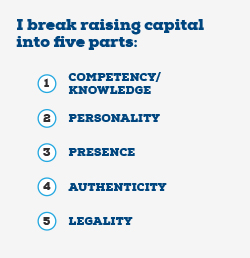 How much real estate would you buy if money was not a limiting factor? I’m guessing the answer is that there is no limit, and you would buy all you could.
How much real estate would you buy if money was not a limiting factor? I’m guessing the answer is that there is no limit, and you would buy all you could.
For most real estate investors, we are limited by our own bank accounts when it comes to purchasing that next income property. What if I could show you how to raise all the money needed for your next deal? Would you still buy that $100,000 house that generates $200-$300 per month in cashflow? How about buying two or three at a time or maybe even your first multifamily property (5 units or above)?
The thing most successful and wealthy investors across any and all industries and niches have in common is their ability to raise capital. Most restaurants, hotels, sports teams, and commercial real estate are bought by groups of investors rather than individuals. The thing is, most large purchases made in the U.S. are done as a syndication.
Once you master the game of raising capital, pretty much anything is possible professionally.
1. Competency/Knowledge
While I can make an argument for any of the five being number one, I feel that it all starts with your knowledge. It doesn’t matter how likeable or friendly you are if you don’t know what you’re talking about. Seek the knowledge and learn all you can about what it is you’re trying to raise money for. Whether you are raising money to buy real estate or unicorns, you still have to be well versed and knowledgeable in your space.
2. Personality
Are you likable and personable? Are you the one in the room that everyone feels they need to meet or know? If so, that’s a big help. If, however, like me, you aren’t great in social settings where you know few if anyone there, you can still succeed. The key is to be likable even if you aren’t the life of the party. Be a good listener and don’t make it all about you and your needs.
Also, don’t be a polarizing and angry person either in person or on your social media accounts. People don’t want to invest with those that they see as hot headed or irrational. You need to assume that people are going to vet you and look at your social media accounts, so be careful how you come across online.
3. Presence
Do you walk with a sense of confidence and purpose? Part of raising money is psychology; if you convey a lack of confidence people are going to be hesitant to give you $50-100k for your deal no matter how good it may be.
With presence comes being aware of how others see you. If you are over-confident or arrogant that will backfire on you. The key here is to exude confidence without being a self-centered jerk who acts like you are the smartest or biggest deal in the room. Be confident yet humble.
Presence also extends to the way you dress and present yourself. Would you give $50-100k to someone who wears shorts, stained T-shirts, and Crocs when networking or has 20 empty McDonalds bags in the backseat of their car? I’m betting not, so why would you not take your own appearance seriously? For potential investors to feel comfortable investing with you they need to feel that you have your own life under control. Dress appropriately. It doesn’t necessarily need to be expensive, you just need to show that you took a bit of time when preparing yourself and didn’t just roll out from under a bridge.
4. Authenticity
Just be you! Don’t put on a show and try to be who you think they “expect” you to be. People are good at recognizing “fake.” If you haven’t had a lot of experience, it’s ok and important to get that out in the open early on. It’s likely going to come up eventually so you may as well get it out front early on.
While owning your lack of experience can seem a bit scary, the best way to get around this is to have a well-rehearsed elevator pitch. You need to be able to quickly explain exactly what you are looking for (age, size, purchase price, etc.). This helps others understand that while you may not have made your first purchase, you are taking this seriously and have a well thought out plan, which in turn should help them get more comfortable with you.
5. Legality
There are right and wrong ways to raise money. You need to consult with a syndication attorney, but I will cover one big thing you need to understand.
For most first timers you will likely not be allowed to advertise your offering, mention it on social media, or discuss it with anyone you don’t already have a pre-existing relationship with. Meeting someone for the first time at a networking event and presenting them with the deal you are currently working on is not allowed in most cases.
The SEC has specific rules for how you are allowed to raise the money needed for your project so please consult with a syndication attorney.
Now that you understand the How of raising money let’s talk about the Who and the Where.
Who is your target audience? Think of the perfect person that your investment would be the ideal solution for. You are probably looking for someone that has investable cash and is a high wage earner. They might be someone looking for alternatives to the stock market and don’t have a lot of time to buy and manage their own investments. You need to put some thought into who you are looking for.
Now, where do these people hang out? Once you’ve identified your ideal investor and where they spend their time, both physically and virtually, GO THERE!
Trying to convert someone that’s not open to investing in your type of product (real estate in this case) is an extreme uphill battle and doesn’t have a high probability of success. Most people that ask for my advice believe that they should of course start with friends and family. Are your friends and family open and receptive to investing in your type of business or asset? If not, trying to convert your 80-year-old mother that insists the only safe way to manage her money is to bury it in the backyard is not likely to be successful. Think through this logically.
Some places to start with for the Where:
- Meet-ups
- Conferences
- Masterminds
- Facebook groups
Once you get the money-raising part down you should be able to grow your real estate business to levels you may never have thought possible. As long as you can continue to find deals that work for your investors’ needs and you are able to build a track record of success, your growth could be unlimited.
Much of this article has dealt with the soft art of raising capital. If you will treat it as a business and conduct yourself with integrity, humility, and transparency, then the sky’s the limit.
























0 Comments